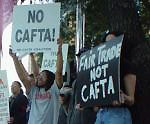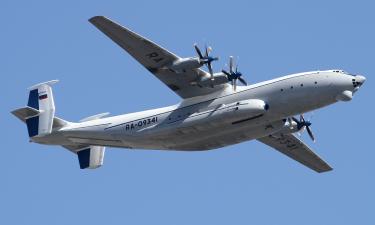US lawmakers to vote controversial free trade pact with Central America
The Bush's administration has been unusually active on a deal that could boost the fading hemispheric agreement
 The US House of Representatives is expected to vote this week the controversial Central American Free Trade Agreement (CAFTA) that aims to extend the NAFTA to the poorest region in the western hemisphere. Despite the deal lacks of relevant economic significance - the six countries of the CAFTA altogether do about as much trade with the United States as The Netherlands - the White House has been unusually active promoting the Congress' ratification.
The US House of Representatives is expected to vote this week the controversial Central American Free Trade Agreement (CAFTA) that aims to extend the NAFTA to the poorest region in the western hemisphere. Despite the deal lacks of relevant economic significance - the six countries of the CAFTA altogether do about as much trade with the United States as The Netherlands - the White House has been unusually active promoting the Congress' ratification.
The CAFTA has been signed last year by the US, Costa Rica, El Salvador, Guatemala, Honduras, Nicaragua and the Dominican Republic, and approved by the US Senate last month. However, despite months of intense effort by President Bush and his officials, the outcome in the House of Representatives is still unclear.
With some political risk, Bush has put CAFTA near the top of his legislative agenda, meeting personally with dozens of lawmakers, giving speeches around the country, encouraging support from Hispanic groups and venturing into textile country in North Carolina, where there's little love for free trade agreements.
"This bill is more than a trade bill," Bush said Thursday in a speech to the Organization of American States. "This bill is a commitment of freedom-loving nations to advance peace and prosperity throughout the Western Hemisphere."
The question is why Bush is so insistent on a free trade deal that is not expected to boost country's economy. The answer can be found in the free trade that has not been signed… yet.
The Free Trade Area of the Americas, or FTAA, has been on the top of the US agenda for Latin America since Bush came to power in 2000. It was expected to come into force in January 2005, but the strong opposition of some South American republics – Brazil, Venezuela and Argentina- has prevented it from running accordingly.
The current stand off in the negotiations has led to loudly claims of victory in Caracas and Havana, but it looks rather premature to certify the death of the moribund FTAA. If Bush succeeds in obtaining the OK of the Congress to the deal with the Central Americans, it is probable to see Washington back in game for the biggest prize in the near future.
And the "near future" has a certain date. During the first week of November, Argentina will hold the IV Summit of the Americas to which Mr. Bush is expected to attend. The Congress' ratification of the CAFTA on time will surely encourage the US delegation to launch an offensive for the FTAA.
Press reports circulating in South America nowadays read about Washington's intentions to renew talks on the agreement that would promote free commerce from Alaska to Patagonia. South Americans look reluctant to even hear about that, but an encouraged US delegation will be hard to ignore.
Subscribe to Pravda.Ru Telegram channel, Facebook, RSS!


